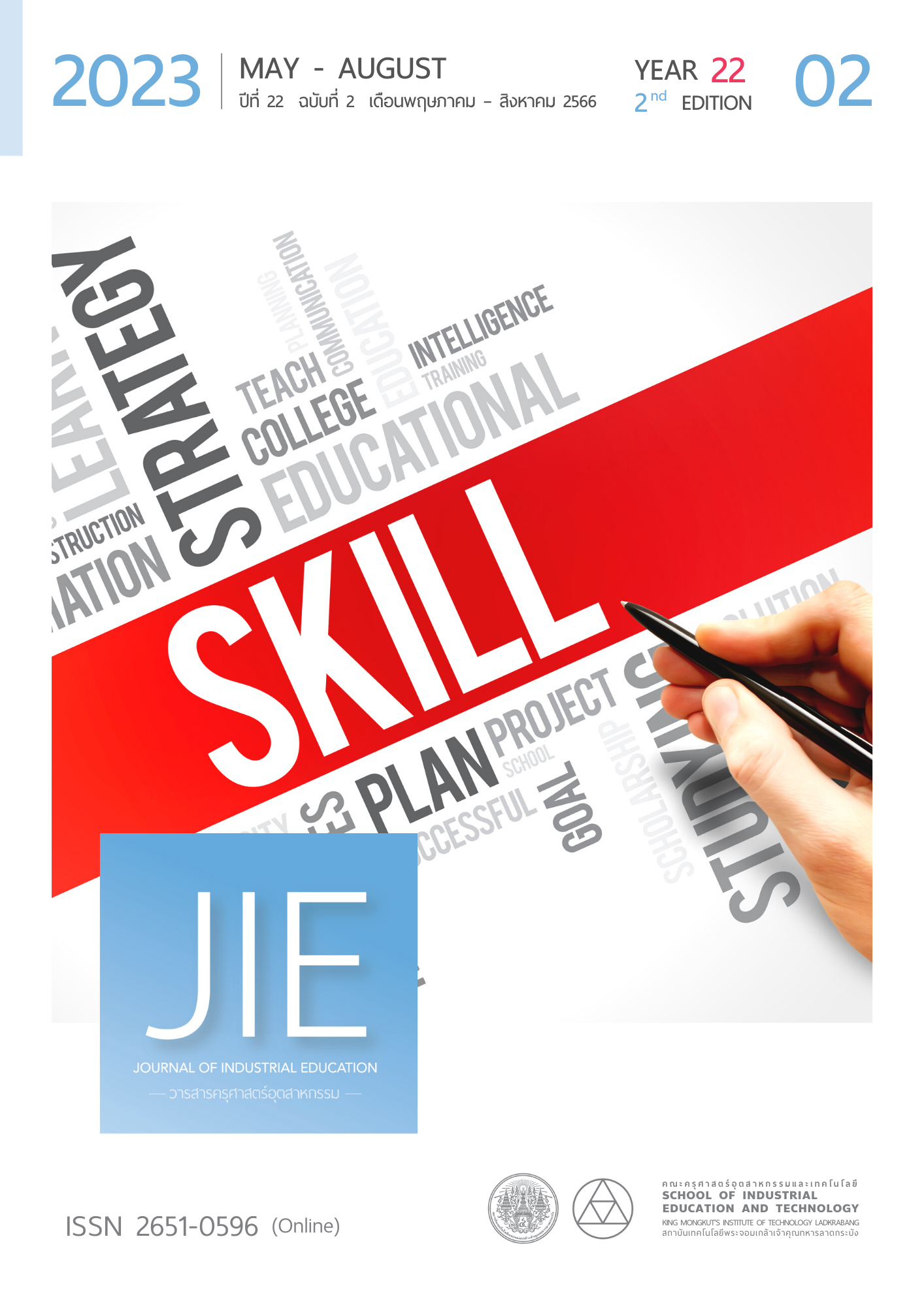ผลของการจัดการเรียนรู้แบบห้องเรียนกลับด้านร่วมกับแอปพลิเคชัน Nearpod ที่มีต่อผลสัมฤทธิ์ทางการเรียนวิชาวิทยาศาสตร์และทักษะการจัดกระทำและสื่อความหมายข้อมูล ของนักเรียนชั้นมัธยมศึกษาปีที่ 3
คำสำคัญ:
ห้องเรียนกลับด้าน, แอปพลิเคชัน Nearpod, ผลสัมฤทธิ์ทางการเรียน, ทักษะการจัดกระทำและสื่อความหมายข้อมูลบทคัดย่อ
งานวิจัยนี้ ได้ศึกษาผลการใช้การจัดการเรียนรู้แบบห้องเรียนกลับด้านร่วมกับแอปพลิเคชัน Nearpod ที่มีต่อผลสัมฤทธิ์ทางการเรียนวิชาวิทยาศาสตร์และทักษะการจัดกระทำและสื่อความหมายข้อมูล เรื่อง ไฟฟ้าและอิเล็กทรอนิกส์ ของนักเรียนชั้นมัธยมศึกษาปีที่ 3 กลุ่มตัวอย่างในการวิจัยครั้งนี้ คือ นักเรียนชั้นมัธยมศึกษาปีที่ 3 ที่กำลังศึกษาอยู่ในภาคเรียนที่ 2 ปีการศึกษา 2565 จำนวน 44 คน โรงเรียนมัธยมศึกษาขนาดใหญ่พิเศษแห่งหนึ่งในกรุงเทพมหานคร ซึ่งได้มาโดยการสุ่มแบบกลุ่ม เครื่องมือที่ใช้ในการวิจัย ได้แก่ 1) แผนการจัดการเรียนรู้ ซึ่งมีค่าความเหมาะสมอยู่ในระดับมากที่สุด ( = 4.71, SD = 0.29) 2) แบบทดสอบวัดผลสัมฤทธิ์ทางการเรียน ซึ่งมีค่าความยากอยู่ระหว่าง 0.50-0.80 ค่าอำนาจจำแนกอยู่ระหว่าง 0.30-0.84 และค่าความเชื่อมั่นเท่ากับ 0.91 และ 3) แบบทดสอบวัดทักษะการจัดกระทำและสื่อความหมายข้อมูล ที่มีค่าความยากอยู่ระหว่าง 0.42-0.58 ค่าอำนาจจำแนกอยู่ระหว่าง 0.42-0.75 และค่าความเชื่อมั่นเท่ากับ 0.90 สถิติที่ใช้ในการวิเคราะห์ข้อมูล ได้แก่ ค่าเฉลี่ยเลขคณิต ส่วนเบี่ยงเบนมาตรฐาน และการทดสอบค่าเฉลี่ยของกลุ่มตัวอย่าง 2 กลุ่มที่ข้อมูลไม่เป็นอิสระต่อกัน ผลการวิจัยพบว่า นักเรียนที่ได้รับการจัดการเรียนรู้แบบห้องเรียนกลับด้านร่วมกับแอปพลิเคชัน Nearpod มีผลสัมฤทธิ์ทางการเรียนและทักษะการจัดกระทำและสื่อความหมายข้อมูลหลังการจัดการเรียนรู้สูงกว่าก่อนการจัดการเรียนรู้อย่างมีนัยสำคัญทางสถิติที่ระดับ .01 การค้นพบนี้ชี้ให้เห็นว่า การใช้การจัดการเรียนรู้แบบห้องเรียนกลับด้านร่วมกับแอปพลิเคชัน Nearpod สามารถช่วยพัฒนาผลสัมฤทธิ์ทางการเรียนและทักษะการจัดกระทำและสื่อความหมายข้อมูลของนักเรียนได้
เอกสารอ้างอิง
Bureekarn, N., & Wattanaburanon, A. (2014). Effects of health education learning management using the flipped classroom approach on responsibility and learning achievement of lower secondary school. An Online Journal of Education, 9(2), 768-782. (in Thai)
Choowong, K., Thiangjit, A., & Cojorn, K. (2021). Enhancing the organizing and communicating data skills on concept of stars in the sky of Mathayomsuksa 3 students by using inquiry-based learning 5E combined with the organizing and communicating data skills training package. Suan Sunandha Academic & Research Review, 15(2), 80-105. (in Thai)
Colburn, A. (2007a). Constructivism and conceptual change, part I. Science Teacher, 74(7), 10.
Colburn, A. (2007b). Constructivism and conceptual change, part II. Science Teacher, 74(8), 14.
Dejsri, P., & Benjawan, P. (2009). Trends in international science study 2007. The Institute for The Promotion of Teaching Science and Technology. (in Thai)
Initiatives Project Management Unit, IPST. (2020). Science training materials: Curriculum for enhancing competencies of modern teachers for 21st century learning. The Institute for the Promotion of Teaching Science and Technology. (in Thai)
Institute for the Promotion of Teaching Science and Technology [IPST]. (2017). Handbook for using the basic science curriculum in the science learning subject group according to the basic education core curriculum, B.E. 2008 (revised edition B.E. 2017) lower secondary level. Author. (in Thai)
Institute for the Promotion of Teaching Science and Technology [IPST]. (2021). PISA 2018 assessment results: Reading, mathematics and science. Author. (in Thai)
Institute for the Promotion of Teaching Science and Technology [IPST]. (2020). Scientific Literacy. https://pisathailand.ipst.ac.th/about-pisa/scientific-literacy/ (in Thai)
Khanhachai, P., & Khlaisang, J. (2020). Development of 5E flipped learning model with infographic design process to enhance science process skills and visual literacy of lower secondary school students. Journal of Information and Learning, 31(3), 25-36. (in Thai)
Limvong, T., & Saengri, Y. (2019). Flipped classroom: New learning for 21st century skills. Mahidol R2R E-Journal, 6(2), 9-17. (in Thai)
Maneerattana, W. (2016). The development of flipped classroom in chemistry on acid-base for enrichment science classroom students [Master’s thesis]. Srinakharinwirot University. (in Thai)
Mattei, M. D., & Ennis, E. (2014). Continuous, real-time assessment of every student’s progress in the flipped higher education classroom using nearpod. Journal of Learning in Higher Education, 10(1), 1-8.
Namoungon, S. (2016). The effects of flipped classroom and team based learning on the introduction to computer information science for undergraduate students [Master’s thesis]. Naresuan University. (in Thai)
National Institute of Educational Testing Service. (2022). Summary of Grade 9 students’ O-NET results of the academic year 2021. https://www.niets.or.th/uploads/editor/files/O-NET/rapidreportM3-2564.pdf. (in Thai)
Nearpod Team. (2017). Using nearpod to support blended and flipped learning [Blog]. https://nearpod.com/blog/using-nearpod-support-blended-flipped-learning-implementations/
Panich, V. (2013). Teachers for students build a classroom upside down. S R Printing Mass Product. (in Thai)
Serin, H., & Khabibullin, A. (2019). Flipped classrooms in teaching method courses at universities. International Journal of Academic Research in Business and Social Sciences, 9(1), 573-585.
Soraphum, T., & Imwut, S. (2021). Development of learning management online teaching with mobile learning in form of active learning to develop the potential of teachers in the spread coronavirus disease 2019 crisis. Journal of Technology Management Rajabhat Maha Sarakham University, 8(2), 48-62. (in Thai)
Srihirun, W. (2017). Critical thinking with flipped classroom. Graduate Studies Journal, 14(65), 19-27. (in Thai)
Summer Gunn. (2019). Flipping the classroom with nearpod: 9 Steps to success. https://nearpod.com/blog/flipping-the-classroom-with-nearpod/
Tiebthong, W., & Wutchana, U. (2021). Study of academic achievement in chemistry of Grade 12 students’ into a learning management of flipped classroom via e-learning courseware. Journal of Roi Kaensarn Academi, 6(6), 65–76. (in Thai)
Tippalert, T. (2017). Teaching of science process skills. Udon Thani Rajabhat University. (in Thai)
ดาวน์โหลด
เผยแพร่แล้ว
รูปแบบการอ้างอิง
ฉบับ
ประเภทบทความ
สัญญาอนุญาต
ลิขสิทธิ์ (c) 2023 วารสารครุศาสตร์อุตสาหกรรม

อนุญาตภายใต้เงื่อนไข Creative Commons Attribution-NonCommercial-NoDerivatives 4.0 International License.
"ข้อคิดเห็น เนื้อหา รวมทั้งการใช้ภาษาในบทความถือเป็นความรับผิดชอบของผู้เขียน"



